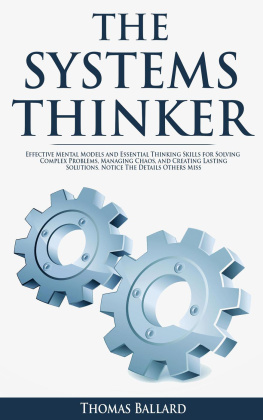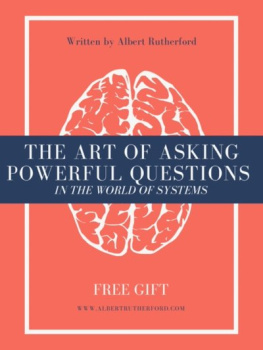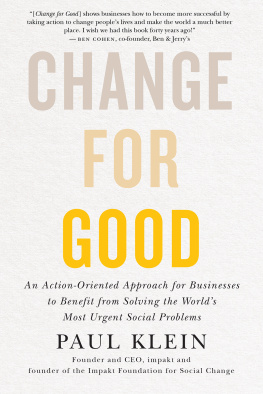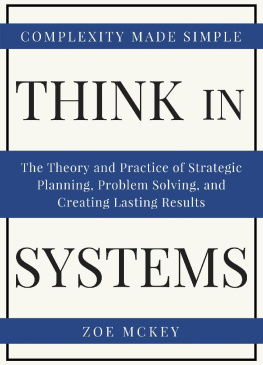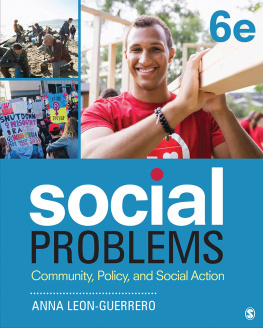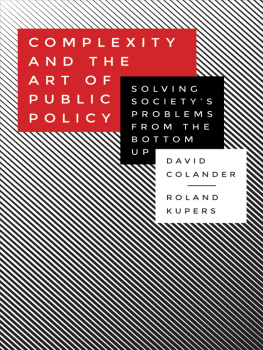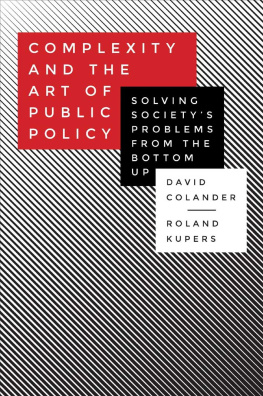Praise for Systems Thinking for Social Change
It is not hard for people to appreciate that fragmented, piecemeal efforts to solve complex problems are ineffective. But having concrete approaches to an alternative is another matter. After almost four decades of applying practical systems-thinking tools in diverse settings, David Stroh has produced an elegant and cogent guide to what works. Research with early learners is showing that children are natural systems thinkers. This book will help to resuscitate these intuitive capabilities and strengthen them in the fire of facing our toughest problems.
Peter Senge, senior lecturer, MIT, founding chair, Academy for Systemic Change, and author of The Fifth Discipline
System s Thinking for Socia l Change uses clear, down-to-earth language to explain and illustrate systems thinking, why it matters, and how it can lead to greater success in the social sector. The book is brief yet deep, big picture yet rigorously analytical. Stroh displays considerable narrative skill, especially when he shares numerous stories from his practice of applying various systems tools that led groups to new and startling conclusions. Reading this book will test the reader substantially, as the author invites us to a deeper level of introspection about our own role in systems failures of every kindorganizational and societaland gently asks us to embrace a new way, not merely of thinking but of being in the world. A remarkable book.
David Nee, Growth Philanthropy Network, and former executive director, William Caspar Graustein Memorial Fund
Drawing on a deep well of experience, Stroh masterfully weaves metaphor, story, and practical tools, modeling for us all effective systems thinking in action. Read it and get ready to take your game up a notch.
Linda Booth Sweeney, author of Connected Wisdom and coauthor of the The Systems Thinking Playbook
David Peter Stroh has been a pioneer in the effort to bring principles of systems into the service of those striving for constructive social change. (I took a course from him over thirty years ago.) Many books tell you how to engage in systems thinking but not how to apply it. This is a very useful exception. Peter draws on many years of professional engagement with the important problems of our society. Of course reading his book wont let you banish all those problems. But it will help you focus your effort where you can have the best impact, and it will show you how to enlist others in the effort.
Dennis Meadows, coauthor of Limits to Growth and former director, Institute for Policy and Social Science
The philanthropic sector has shifted from a charity mindset to a focus on changing systems to create sustainable change. Systems Thinking f or Social Change offers practical tools for those serious about improving communities and organizations. It doesnt minimize the complexity, but rather empowers social-change agents with tools to understand the complexity and identify the leverage points.
Teresa Behrens, director, Institute for Foundation and Donor Learning
If there is only one book you read on systems thinking, it should be Systems Thinking for Social Change . If youre new to systems thinking, I consider this a must read. If youve been involved in systems thinking for some time and want a renewed and extended perspective, I highly recommend it. Strohs new work covers all the relevant areas appropriate for a solid introduction to systems thinking, though it doesnt stop there. It makes a serious contribution by detailing a number of real-world situations that have been investigated and improved using the approach presented in the book. And it does very well something that Ive not seen done before: it not only shows how to map the current system, but also shows how to then create a revised map of how the system is intended to work in the future. This approach ends up identifying where measurements should be made on an ongoing basis to ascertain whether the system is undergoing the intended transformation.
Gene Bellinger, director, Systems Thinking World, Inc.
With this book Stroh has produced an essentialand long overdueguide to applied systems thinking. A few well-selected examples of initiatives that turned from working to transformative lay the foundation for how change makers can address chronic, complex social problems and deepen their impact. After helping the reader recognize what might be holding their interventions back, the book moves with ease into ways of finding leverage, the use of systems stories, and the power of visioning. In Strohs capable hands, systems thinking becomes a tool for defining personal or organizational priorities, for planning, and for evaluating success through measurable indicators. But the book is much more than a formidable toolbox from which to draw on a daily basis. It is, at its deeper level, a warm invitation to cultivate systems thinking as a way of being, not just doing, so that on the way to long-lasting, desirable outcomes, change makers can become more and more the change they want to see.
Marta Ceroni, executive director, Donella Meadows Institute
David Stroh, in his invaluable new book, shows that good intentions are not enough for those who aspire to make lasting progress on fundamental social issuesand also how the language and tools of systems theory can provide a deeper understanding of the root causes and help identify the leverage points for productive and sustainable change.
Russell Eisenstat, executive director, Center for Higher Ambition Leadership
Over fifteen years ago, David Stroh was instrumental in introducing systems thinking to the peace-building field, using tools that have proven to be powerful for improving the effectiveness of our work. This book is a valuable resource for our fielda must read for all practitioners who have been seeking practical and easy-to-understand guidance on using systems thinking for conflict analysis and strategic planning.
Diana Chigas, professor of practice, Fletcher School of Law and Diplomacy at Tufts University, and co-director of collaborative learning, CDA Collaborative Learning Projects
Stroh has offered an important gem in his new book, Systems Thinking for S ocial Change . Both illuminating and immediately useful, the book shares the key dynamics and success factors gleaned from his long career of working with organizations struggling with societys most persistent issues. A must read for anyone whose aim is to make a difference on the ground.
Kristina Wile, co-president, Leverage Networks, and managing partner, Systems Thinking Collaborative
This is a must read for public leaders and citizens who are interested in the learning disciplines required for a sustainable, proactive approach to preserving our shared resources.
Georgianna Bishop, president, The Public Sector Consortium
For those who have worked for many years in the social-service sector and who have grown cynical or disillusioned as to whether it is even possible to effect major social change, David Peter Strohs book, Syste ms Thinking for Soci al Change , is a must reada clear, thoughtful, and practical guide for those desiring to create lasting social change. But reader beware! Systems thinking is more than a new way of thinking. As Stroh puts it, it is a new way of being. It requires the ability to look at things in a new way, to interact with others differently, to have a clear vision of where you want to go, a willingness to see things the way they are, and, finally, the courage to take responsibility for why the system as is isnt working. If you want to help create long-lasting, effective social change, if you want to say were doing itwere actually making progress, then read this book.
Anne Miskey, executive director, Funders Together to End Homelessness
As philanthropic organizations increasingly seek to strengthen their impact, the perspectives, methods, and tools described in Strohs book provide us with critical guidance for thinking and action to address complex social problems and for building all-in approaches to problem solving. Anyone in government, nonprofits, or philanthropy can benefit from this approach to solutions. And while it might take a lifetime to master the use of systems thinking for social change, reorienting how we think about problems in this way can immediately set us on a new path toward sustainability and greater likelihood of success.
Next page

